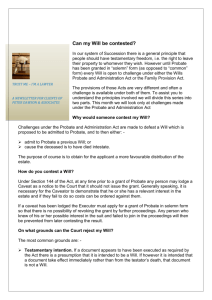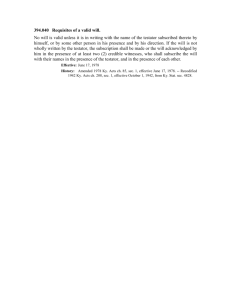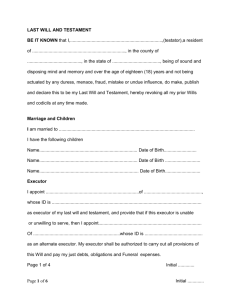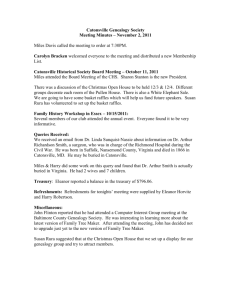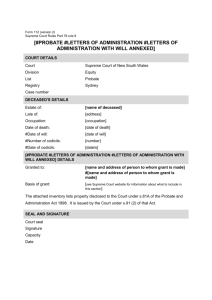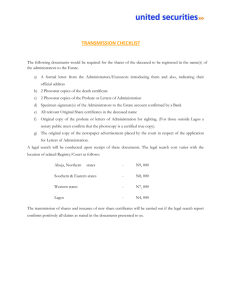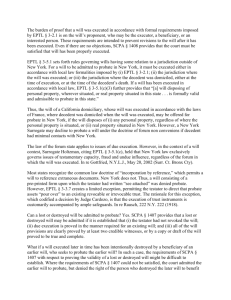Formalities (Week 4)
advertisement
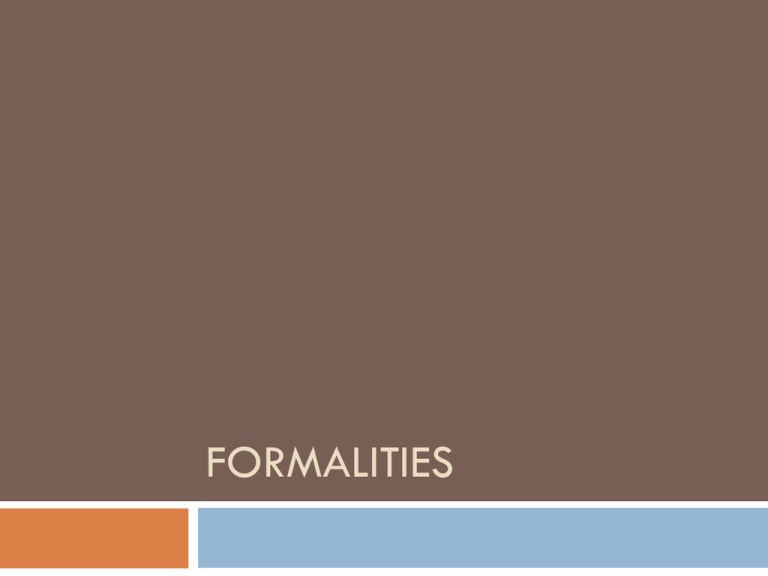
FORMALITIES Requirements of a Valid Will INTENTIONALITIES FORMALITIES Capacity Undue Influence Fraud Duress In Writing Signed By The Testator Witnessed OR Holographic Why In Writing? Probate Code Section 6110. (a): “Except as provided in this part, a will shall be in writing and satisfy the requirements of this section.” Who Is The Testator? Probate Code Section 6110. (b): “The will shall be signed by one of the following: (1)By the testator. (2) In the testator's name by some other person in the testator's presence and by the testator's direction. (3) By a conservator pursuant to a court order to make a will under Section 2580.” How Do You Witness A Will? Probate Code Section 6110 (c): “(1) Except as provided in paragraph (2), the will shall be witnessed by being signed, during the testator's lifetime, by at least two persons each of whom (A) being present at the same time, witnessed either the signing of the will or the testator's acknowledgment of the signature or of the will and (B) understand that the instrument they sign is the testator's will. When Do The Witnesses Sign? Can You Sign At Any Time? Estate of Saueressig Holds That The Witnesses Must Sign The Will Before The Death Of The Testator. Why Does This Case Control And Not Estate of Eugene? Why Does The Court Dismiss The Uniform Probate Code? What Does This Court Have To Say About The Importance of This Formality? Estate of Eugene What Is Wrong With Allowing Post-Death Witness Signatures When There Is The Disposition Is Uncontroverted And There Is No Indication of Fraud? Who Can Be A Witness? Probate Code Section 6112. (a): “Any person generally competent to be a witness may act as a witness to a will.” But Don’t Witnesses Have To Be Disinterested? Probate Code Section 6112 (b): “A will or any provision thereof is not invalid because the will is signed by an interested witness.” A Disinterested Witness Does Not Invalidate The Will, But… Probate Code Section 6112 (c): “Unless there are at least two other subscribing witnesses to the will who are disinterested witnesses, the fact that the will makes a devise to a subscribing witness creates a presumption that the witness procured the devise by duress, menace, fraud, or undue influence. This presumption is a presumption affecting the burden of proof. This presumption does not apply where the witness is a person to whom the devise is made solely in a fiduciary capacity.” What If The Presumption Is Not Rebutted? Probate Code Section 6112 (d): “If a devise made by the will to an interested witness fails because the presumption established by subdivision (c) applies to the devise and the witness fails to rebut the presumption, the interested witness shall take such proportion of the devise made to the witness in the will as does not exceed the share of the estate which would be distributed to the witness if the will were not established. Nothing in this subdivision affects the law that applies where it is established that the witness procured a devise by duress, menace, fraud, or undue influence.” Let’s Go Back To Estate Of Saueressig So They Only Have One Witness Signature, What Do They Do? Probate Code Section 6110(c)(2): “If a will was not executed in compliance with paragraph (1) [witness signature requirements], the will shall be treated as if it was executed in compliance with that paragraph if the proponent of the will establishes by clear and convincing evidence that, at the time the testator signed the will, the testator intended the will to constitute the testator's will.” Holographic Wills Probate Code Section 6111: “(a) A will that does not comply with Section 6110 is valid as a holographic will, whether or not witnessed, if the signature and the material provisions are in the handwriting of the testator. (b) If a holographic will does not contain a statement as to the date of its execution and: (1) If the omission results in doubt as to whether its provisions or the inconsistent provisions of another will are controlling, the holographic will is invalid to the extent of the inconsistency unless the time of its execution is established to be after the date of execution of the other will. (2) If it is established that the testator lacked testamentary capacity at any time during which the will might have been executed, the will is invalid unless it is established that it was executed at a time when the testator had testamentary capacity. (c) Any statement of testamentary intent contained in a holographic will may be set forth either in the testator's own handwriting or as part of a commercially printed form will.” Estate Of Williams No Legal Signature What Signature Counts? Can Be Legal Signature, Initials, Nicknames, A Title, Etc., Just Needs Sufficient Indicia Of Completeness From Which To Conclude That The Name Was Intended To Be A Mark Of Authentication. What About Concern Of Counterfeit? No Testamentary Language What Does The Testator Have To Intend? Not Create A Will, Only Make A Disposition Of Property Upon Death. What Evidenced The Testator’s Intent In This Case? Estate Of Brenner Why Wasn’t The Court Concerned Of Digital Manipulation? What If The Document Was Scanned Instead Of Photocopied? In Re Estate Of Kuralt Was The First Holographic Will Valid? Was The Letter A Valid Holographic Will? What Is The Biggest Take Away From This Case? Every Document Can Be Considered A Will If You Underline The Word, “Inherit” What Satisfies The Handwritten Material Provisions Requirement? Estate Of Williams “Whether a document should be admitted into probate as a holographic will depends on…whether words establish that it was intended to be the author’s last will and testament at the time she [or he] wrote it…Courts are to use common sense in evaluating whether a will constitutes a holographic will.” Estate Of Brenner The Handwriting Does Not Have To Be The Original Writing. Estate Of Sola A Purported Holographic Will That Relies Upon Typewritten Writing Found In The Document, Cannot Be Found A Valid Holographic Will What Can Be Considered Part Of The Will? Probate Code Section 6130 “A writing in existence when a will is executed may be incorporated by reference if the language of the will manifests this intent and describes the writing sufficiently to permit its identification.” Probate Code Section 6131 Best Illustrated By Groupings, “I Give To My Students All Of My Debt” Probate Code Section 6132 Allows For Incorporation By Reference Of Writings Disposing Of Non-Money Tangible Personal Property, Even If The Writing Is Made After The Will Executed Will Interpretation Probate Code Sections 21120, 21121, 2122 Sets Forth The Following: Every Provision Is To Be Presumed To Have An Effect Likewise, Every Will Is To Be Presumed Valid If One Provision Is Ambiguous, Another Provision May Be Referenced To Explain The Ambiguous Provision Words Should Be Given Their Plain Meaning, Unless They Are Technical Terms, Unless Then They Should Generally Be Given Their Technical Meaning From Estate Of Goyette: “The fact that he made a will raises the presumption that he intended to dispose of all of his property.” How To Resolve Mistaken Or Ambiguous Language Probate Code Section 6111.5: “Extrinsic evidence is admissible to determine whether a document constitutes a will pursuant to Section 6110 or 6111, or to determine the meaning of a will or a portion of a will if the meaning is unclear.” Extrinsic Evidence Citizens Business Bank v. Carrano Extrinsic Evidence Can Only Be Introduced When Language is “Fairly Susceptible” To More Than One Interpretation. Extrinsic Evidence Cannot Be Introduced To Show Ambiguity. In Re Estate Of Kuralt What Ambiguity Was The Court Resolving?
